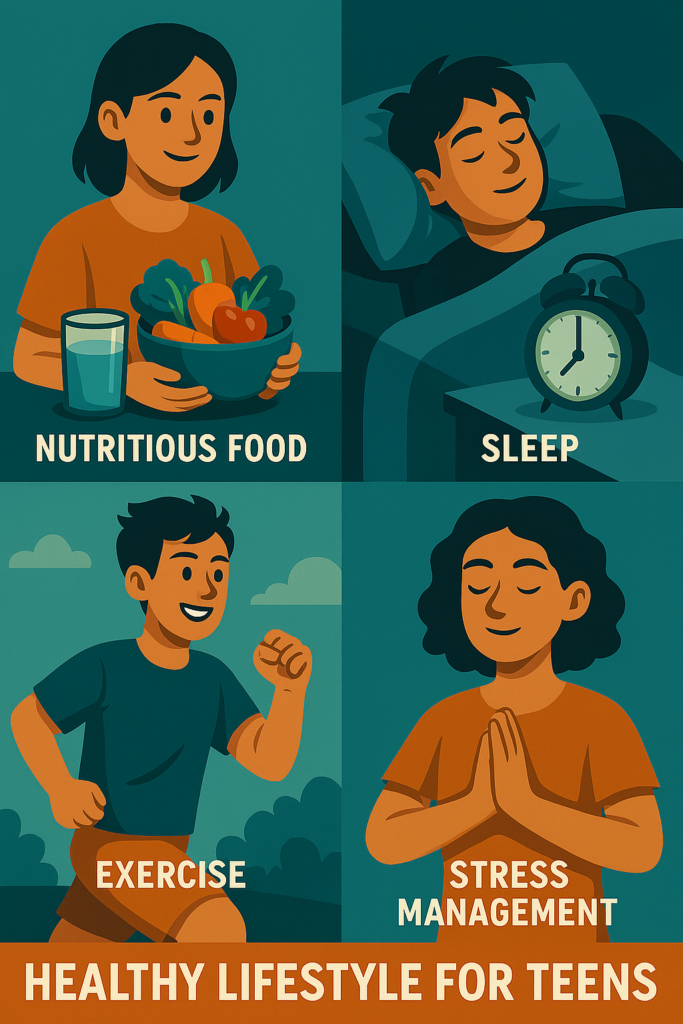Thyroid issues, once primarily a concern among middle-aged adults, are increasingly being diagnosed in teenagers around the world. The butterfly-shaped gland located in the neck is small in size but mighty in function, influencing everything from metabolism to brain development. Today, researchers, pediatric endocrinologists, and public health officials are witnessing a troubling rise in thyroid-related disorders among adolescents. This blog unpacks the causes, symptoms, impacts, and prevention strategies while highlighting the importance of early diagnosis and holistic care.
Understanding the Thyroid Gland
What Is the Thyroid? The thyroid is an endocrine gland that produces hormones like thyroxine (T4) and triiodothyronine (T3), which regulate metabolism, growth, and energy levels. These hormones are critical during adolescence when the body undergoes significant physical and hormonal changes.
Functions of Thyroid Hormones
- Regulate metabolism and body weight
- Influence heart rate and body temperature
- Support brain development and cognitive functions
- Impact growth and development
The Alarming Statistics: A Rising Trend
Global Perspective Recent studies show a 30% increase in diagnosed thyroid disorders among adolescents over the past decade. Countries like India, the U.S., and the U.K. are reporting a surge in conditions such as hypothyroidism, hyperthyroidism, and autoimmune thyroiditis.
Gender Disparity Girls are significantly more likely to develop thyroid issues, particularly autoimmune types like Hashimoto’s thyroiditis, due to hormonal fluctuations and genetic predisposition.
Causes and Risk Factors
Environmental Triggers
- Exposure to endocrine-disrupting chemicals (EDCs) in plastics, cosmetics, and pesticides
- Iodine deficiency or excess
- High radiation exposure, especially in areas with nuclear contamination
Genetic and Autoimmune Causes
- Family history of thyroid or autoimmune diseases
- Presence of other autoimmune conditions like Type 1 diabetes or celiac disease
Lifestyle and Dietary Factors
- Poor diet lacking in iodine, selenium, and zinc
- High levels of stress and inadequate sleep
- Increased screen time and sedentary habits affecting metabolism
Common Types of Teen Thyroid Disorders
Hypothyroidism A condition where the thyroid produces insufficient hormones. Common symptoms include fatigue, weight gain, depression, constipation, and cold intolerance.
Hyperthyroidism Overproduction of thyroid hormones. Symptoms include weight loss, nervousness, increased heart rate, and excessive sweating.
Hashimoto’s Thyroiditis An autoimmune disorder where the immune system attacks the thyroid gland, leading to gradual thyroid failure.
Graves’ Disease Another autoimmune condition, more prevalent in teenage girls, causing hyperthyroidism due to antibody stimulation of the thyroid.
Symptoms Often Overlooked in Teens
- Mood swings and irritability
- Academic underperformance
- Irregular menstrual cycles
- Hair thinning and dry skin
- Stunted growth or delayed puberty
These symptoms are frequently dismissed as typical teenage behavior, delaying diagnosis.
Diagnosis and Medical Tests
Blood Tests
- TSH (Thyroid Stimulating Hormone)
- Free T4 and Free T3
- Thyroid antibodies (Anti-TPO, Anti-thyroglobulin)
Imaging Tests
- Thyroid ultrasound to detect nodules or inflammation
- Radioactive iodine uptake tests in certain cases
Treatment Options
Medication
- Levothyroxine for hypothyroidism
- Antithyroid medications for hyperthyroidism
- Beta-blockers to manage symptoms like rapid heart rate
Lifestyle Interventions
- Nutrient-rich diet with adequate iodine, selenium, and zinc
- Stress management techniques like yoga and mindfulness
- Encouraging physical activity
Regular Monitoring Adolescents require frequent check-ups to ensure optimal hormonal levels and to adjust treatment.
Psychological and Social Impacts

Mental Health Concerns Thyroid imbalances can trigger anxiety, depression, and low self-esteem. Teenagers may feel isolated or misunderstood.
Academic and Social Challenges Concentration difficulties and fatigue can lead to poor academic performance and reduced participation in social activities.
Preventive Strategies and Awareness
Parental Awareness Parents should be aware of early signs and push for diagnostic testing when in doubt.
School and Community Role Schools can offer health screenings and create supportive environments for students dealing with chronic health conditions.
Government and Healthcare Initiatives Public health campaigns focusing on iodine fortification, EDC regulation, and early screening can mitigate risks.
Real Stories: A Glimpse into Teen Experiences Case studies and testimonials from teens who have navigated thyroid conditions can be both enlightening and encouraging for others.
Future Outlook and Research Directions Advances in genetic testing, personalized medicine, and better diagnostic tools are likely to improve detection and management of thyroid disorders in teens.
Conclusion
The rise in teen thyroid issues is a pressing public health concern that demands awareness, early intervention, and comprehensive care. As society becomes more attuned to these challenges, parents, educators, and policymakers must collaborate to ensure the well-being of our youth. With timely diagnosis and proper management, teens with thyroid disorders can lead healthy, fulfilling lives.









+ There are no comments
Add yours